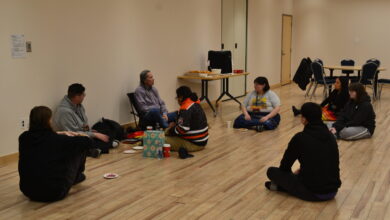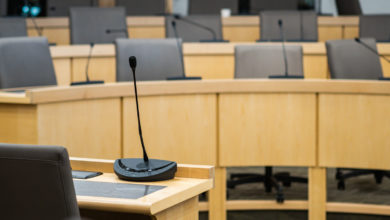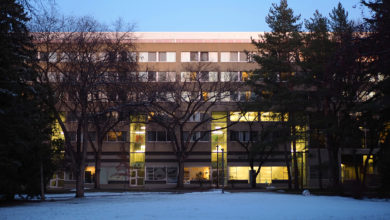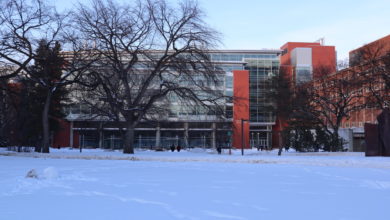“Land back” and “genocide” spray painted on U of A sign
The Gateway spoke to the ISU about what land back means and can look like at the U of A.
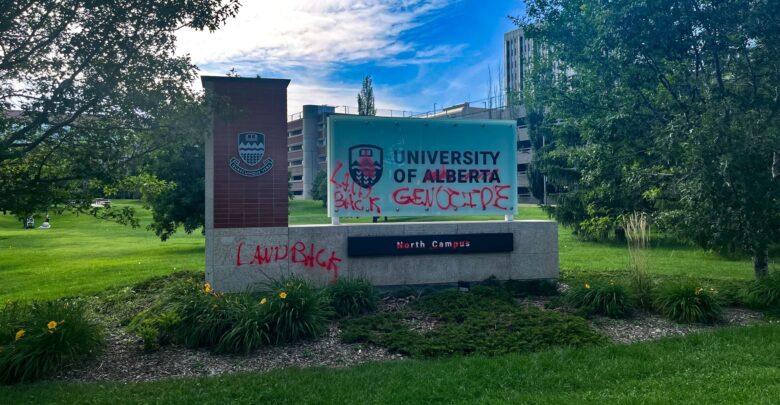 Leah Hennig
Leah HennigOn July 1, a photo of a University of Alberta sign that had been vandalized started circulating on social media. “Land back” was spray-painted onto the sign located at the corner of 112 Street and 82 Avenue. The “Alberta” of “University of Alberta” was crossed out on the sign and “genocide” was spray painted below.
A statement provided by U of A media relations said that the U of A Protective Services (UAPS) discovered the graffiti at about 8:30 a.m. on July 1. According to the statement, the graffiti had been removed by 6:30 p.m..
No other signs or landmarks were vandalized, the statement said.
The statement also said that UAPS is continuing to actively investigative and monitor the matter.
That “includes providing proactive and directed patrols by the uniformed Community Patrol Services team.”
The statement said that an online report with the Edmonton Police Service (EPS) was also filed.
On the subject matter of the graffiti, the statement said “we are committed to reconciliation in post-secondary education and research, and to addressing the historical legacy of the residential school system and Canada’s colonial history in a meaningful and lasting way.”
“It’s not about starting from scratch, it’s about restoring meaningful governance,” Snow says
Emma-Leigh Snow is the Indigenous Students’ Union‘s (ISU) vice-president (external) for the 2025–26 year. Snow is a member of the Métis Nation within Alberta, Otipemisiwak. She spoke to The Gateway about what land back is.
“Land back is a movement and it’s basically putting the importance on Indigenous ecological knowledge being valued,” she explained.
Snow clarified that it’s not about mass deportations or evictions. “It’s about restoring Indigenous governance and stewardship over traditional lands while addressing historical injustices.”
She explained that while returning land is central to the movement, it’s also about Indigenous sovereignty, self-determination, environmental protections, economic justice, and cultural revitalization.
“It’s not about starting from scratch, it’s about restoring meaningful governance,” Snow said.
She also said it’s relevant not only across Turtle Island, otherwise known as North America, but globally as well.
“We see the movement in Palestine, with Indigenous Peoples worldwide advocating for land sovereignty and knowledge sovereignty,” Snow said.
“Why are people who are speaking out about injustices being punished so severely?” Snow asks
When asked what land back does or can look like at the U of A, Snow said the ISU had discussed a number of calls to action.
Snow said she’s heard Marc Dumouchel, the general manager at the U of A Students’ Union (UASU), rave about the pride in protests that have happened in the past at the U of A.
“Today, the U of A has made it clear that they will take violent actions against students protesting,” Snow said.
In May 2024, the U of A asked EPS to remove the Palestine solidarity encampment on Main Quad. This drew criticisms from different groups, including the ISU.
“This is unacceptable. If the university is a place of sharing knowledge and creating change, why are people who are speaking out about injustices being punished so severely? And then, I will add onto that, to blatantly deny that any violence had occurred. I think Bill Flanagan [president and vice-chancellor of the U of A] needs to take accountability for that.”
Another call to action is to go beyond land acknowledgements.
“You can’t just steal someone’s phone and be like ‘I have your phone, I’m acknowledging it.'”
She added that “Canada is not multicultural. Multiculturalism is another word for colonization. What it is is multinational. There are nations on top of nations, there are nations alongside nations.”
Snow noted that Indigenous governments have no legal representation in institutions of universities.
“This has to change at all levels of the university if they intend to actually represent the people that they occupied,” Snow said. “They hold power from treaties over what happens on this land and there needs to be meaningful consultations and relationships built between institutions like the university and Indigenous government structures.”
“Individuals can think about how they can use this knowledge to create meaningful change,” Snow says
A third call to action is to support Indigenous students, professors, and knowledge.
“Underfunding and talks of dismantling the Native studies faculty is violence against Indigenous knowledge sovereignty. This will be treated as an attack to silence and perform ongoing erasure for Indigenous epistemologies and ontologies.”
For what individual students and professors can do, Snow said educating yourself on the land back movement is key.
Snow recommended the Idle No More and YINTAH documentaries, as well as “Decolonization is not a metaphor“ by Eve Tuck and K. Wayne Yang.
“Individuals can think about how they can use this knowledge to create meaningful change,” Snow said.
She explained that knowledge mobilization, sharing what you’ve learned, is an important part of that.
“I think people should know the history of the U of A and how it came to be,” she said.
Snow explained that the colonial government removed already starving women, children, and Elders from the Papaschase Cree Nation. Not long after, the U of A was founded on that land.
Snow mentioned that the ISU hasn’t always been given information or included in conversations. She mentioned discussions of having a medicine garden on campus that the ISU hasn’t been kept up to date with.
Snow also noted the construction currently happening outside the ISU lounge, which means they cannot currently use that green space.
“Nobody ever notified us and there were times where our doors were blocked and we were never told about it,” Snow said.
She said the ISU is unsure if the construction will be done and if they will be able to use the green space outside their lounge come September.
“The university needs to protect our rights to graduate, our rights to protest, protect our right to knowledge mobilization,” Snow said. “Again, I’ll repeat what Palestine protests kind of talk about: divest and disclose.”

